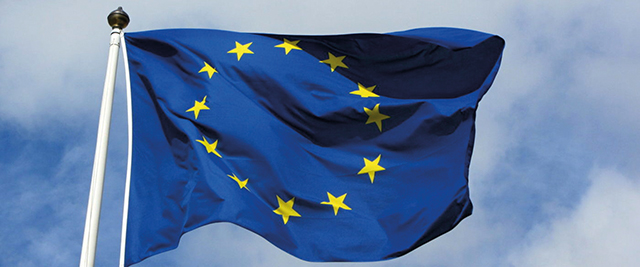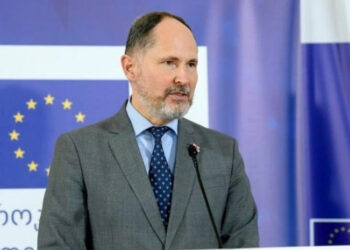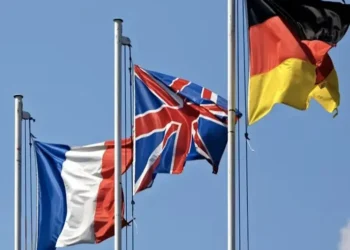I think Putin wants to return to more natural geopolitics based on force, – Bruno Maçães, a Portuguese politician, geopolitics expert and author, tells RFE/RL. “He also suggests in many of his speeches that Russia’s contribution is to destroy the existing order; that that’s where Russia can change history and then a new world will be created, but not by Russia alone. Putin has the awareness that Russia does not have that ability. It will be created by the new emerging powers. China will play the main role, Russia will make a contribution and the United States will also be part of it. According to Putin, the current order is very fragile- just a little push and the whole building will collapse. That’s what’s happening now: Ukraine is the push.”
Bruno Maçães is a senior advisor at Flint Global, a member of the European Council on Foreign Relations, a former Secretary of State for European Affairs in Portugal, and is the author of three books: Dawn of Eurasia: On the Trail of the New World Order, Belt and Road: A Chinese World Order, and History Has Begun: The Birth of a New America. We sat down with him to pick his brain on the latest developments.
Is the international order collapsing?
It’s under a lot of pressure and will need to be rebuilt. We cannot have the illusion that everything is going to remain exactly the same. The way to counteract Putin is to rebuild a more solid international order, with some differences from the previous one. For example, the question of energy is the main one – it is obvious that the existing energy trade network is simply not stable, but change is going to take a while.
The problem is that Russia is still a big part of the existing order. Once Russia says it’s not playing by the rules, and will no longer participate, that alone is sufficient to create a huge level of chaos and disorder. Russia was at the center of the global economic order, and some think the World Economic Order is ultimately based on energy. So you cannot say that Russia is North Korea or Turkmenistan or even Iran. It was very central to the existing order, and Russia removing itself from that order has consequences, and, whether you like it or not, it will have to be rebuilt.

What should the West’s strategy be to counteract?
A real energy transition is needed. We had this concept of transition where it was done almost overnight, flipping a switch. That’s created a lot of instability too. It has to be a strategic transition over a decade or two, well-planned, with the necessary investment at the level of society – none of this has been prepared.
The debate on climate and energies I see in Europe is based on ethics and almost nothing else. As if this is an ethical question. It’s political, economic, geopolitical. We need a more phased-out transition, more prudent, slower and more strategic. Second, we need to develop a realistic global energy network, with many countries that perhaps we didn’t think about as partners, but who should be, in the Gulf and Africa for instance, Angola and Mozambique have a lot of natural gas. We need to build the infrastructure, invest money in LNG terminals, not just in the US, but in many African countries. This has never been done before. We need to work with Egypt and Algeria, there’s a lot to do there. We need to create infrastructure inside Europe, diversify to other energy sources, hydrogen and biofuels. Until now, we’ve been too addicted to cheap Russian natural gas.
What else needs to be done apart from in the energy sector?
Planning future energy is central, that’s where we are really vulnerable. But in the immediate short term, it is of critical importance for Europe to guarantee that Ukraine survives as a state and provide Ukraine with weapons.
How competent and up-to-date is western support, including military?
The priority now is heavy artillery, but we only started to address that when it became a priority. There was no planning ahead of time. Now we can see that within two, three months, the problem for Ukraine is going to be tanks, which are getting depleted, and this means more logistical hardship, so we should start preparing for that right now. Many people in the West are slowly moving to the conclusion that we need to give Ukraine unconditional support. Once we reach that conclusion, things will improve. But it’s been difficult. There were even concerns that Ukraine would not be able to operate some of these armaments, or that they might fall into Russia’s hands. It’s been a slow learning process, but it’s happening.
Might it be too late for Ukraine when we realize the need to give them unconditional support?
There’s a danger that many people that didn’t have to die, will die. I don’t think there’s a danger of a collapse on the front line. I think the war will last a long time, there will be successes and failures, ups and downs. That should be an argument to speed things up. But no, I don’t think there’s a danger of Ukraine collapsing at this point. It is important that particularly America was very doubtful that Ukraine could resist, and now they are being convinced she can.
As the war drags on, as its effects become more visible and felt by people in the West, we also hear growing calls to nudge Ukraine towards a ceasefire. How much of a concern might it be that Kyiv will be pressured into an unfavorable agreement?
This is where it’s important to have these debates in public, because it depends how we understand the problem. If you believe that a ceasefire is the way to ensure peace, then you might be tempted. But if you think that a ceasefire will only last a few months, and then Russia would resume the war, then it’s just postponing the problem and thus is pointless. I’m one of those who thinks that the only way to solve this is to have some kind of Ukrainian victory. If Putin then wants to present it in Russia as his own victory, that’s fine. But, objectively, it has to be a victory for Ukraine. A return of many of these occupied territories, particularly Kherson in the south, all the territory around Sumy, and so on, is necessary for two reasons: Only defeat will ensure that Russia does not try again; only a Ukrainian victory will ensure the health and future of Ukrainian democracy. The current situation is very positive in Ukraine: there’s unity and stability. But all that could change if we allow Ukraine to be defeated. It is important to make it clear in the public debate that this so-called ceasefire would have extremely negative consequences for democracy in Ukraine, and for peace. A ceasefire would not give us peace; it would not give us democracy.
The French President suggested not to humiliate Putin and Russia because that will create bigger problems down the road. What’s your take on that narrative?
I think it’s misguided. But we first have to point out that Macron is on Ukraine’s side. Macron is on our side, but his strategy seems to be misguided. As I understand it, it’s just his attempt to find his own ground, his own distinctive position. He thinks that in order for France and for himself to play a role, he has to find a position that is different from the United States and United Kingdom – he could never compete with the US or Britain in terms of military support or in terms of a discourse of opposition to Russia, so he’s trying to find some empty ground. But we don’t need a good cop to deal with Putin, because Putin himself has made it clear he’s not interested in any viable negotiation: He’s interested in destroying Ukraine, so the good cop is counterproductive.
While the first package of sanctions was adopted in a day, the sixth took longer and ended with a compromise. Is that a concern? How much effect are the sanctions really having on Russia?
I always thought the sanctions were about the long term and whether Russia could pose a threat to other European countries, to the European order. I support financial and technological sanctions, but we should have our expectations well-defined – they work slowly and will affect Russia economically in the future. I never thought they would help Ukraine. If you want to prevent a Russian victory in Ukraine, it’s the arms supply that’s important. Sanctions are about the strategic view of our relations with Russia in 20 years.
People who think we just have to wait until Putin dies are very mistaken
I never believed this idea that Swift or other sanctions would cause the immediate collapse of the Russian economy, therefore, I’m not disappointed by the result. It’s about the long term. If you have the Russian economy contract 10% this year, clearly, Russia is running out of gas and oxygen to build a powerful army, but then they already have a powerful army in the present.
Putin mentioned that now his vision is set to 18th century Russia. The question is how far do his “Peter the Great” ambitions and his appetite for grabbing land go?
I think we’re seeing the limitations of Russian power already. Clearly, Ukraine is a priority for him. Now, there will probably be a period of consolidation if he is successful in Ukraine. I was in Ukraine last week, and one thing that people were discussing is that, perhaps in the future, Putin will use Ukraine as a tool for further adventures. If he conscripts Ukrainians forcefully to the Russian army, if he uses Ukrainian industrial and military bases. It seems to be the strategy to use forces from other minorities in Russia (Chechens, South Ossetians, etc). This has happened in the past in Russian and Soviet military history. We in Europe have lost contact with such practices that seem barbaric to us, but they are as old as Mankind; the Romans did the same. If he follows that path, it will take a while, it won’t be immediate. After a period of consolidation of two or three years, Russia could then become stronger, because it would certainly be a much larger country, including large parts of Ukraine.
Which countries should feel they’re being targeted by the Kremlin as their next prey?
I don’t think this is an immediate issue, or Putin himself would be acting on it, but I think we’re going to see a continuation of many of his policies after him, because Putin is not the one who came up with them. We have to think strategically. People who think we just have to wait until Putin dies are very mistaken. It could happen within a period of five years and then, obviously, we’d have to be more concerned about what could happen in countries that are not part of NATO. Moldova is obviously vulnerable. Another possibly threatened country is Bosnia. You could see Republika Srpska declare independence and Russian troops called in. That’s an interesting scenario. Ukraine is very important here, because if Russia is in charge of Ukrainian airspace, as it could very well be already, then they could fly through Ukraine and perhaps get Hungary to give them flight permission and get a path straight to Republika Srpska. If Russia is not defeated in Ukraine, this is the kind of scenario we’ll be discussing. Even the idea that this could happen is already incredibly destabilizing. We’re talking about Russian troops parachuting 300 kilometers from the German border. That’s one reason for Germany to think about these things more seriously.
A ceasefire would not give us peace; it would not give us democracy
What about the South Caucasus?
I don’t think it would be a priority. Some developments have happened. You have Russian troops very much present in Armenia, patrolling the Turkish border. I think Turkey is a good balancer to Russian power in the region. Azerbaijan has been able to develop a very clever and strategic policy as well. So I would be less concerned. Yes, we could also see developments in Georgia. But let’s not exaggerate Russia’s ability to create havoc everywhere, because another thing that the war has shown is that its capacities are limited.
How much can Putin bank on Chinese and Indian support? Will their stances change depending on how well Putin does in Ukraine?
To some extent, yes. I think China and India would be quite happy to see a more balanced, multipolar global order, so a reduction of American power would be welcomed. But it’s not that India or China support Russia or that they have an alliance. They support Russia’s opposition to the West, which is a different thing. To the extent that Russia can limit or constrain American power globally, China is very happy. But India has also been a bit of a puzzle during this crisis, because they are one of the very few countries that have not yet condemned Russia in any way.
What’s your take on the EU member country candidate status being given to Ukraine and Moldova, while Georgia will get it after it complies with certain conditions?
For me, the enlargement is about creating a powerful stable geopolitical actor, rather than expanding the European way of life or enlarging the single market. The question I ask is, are Ukraine, Moldova and Georgia aligned geopolitically with Europe? Do they have the same vision of the world order? Do they have the same adversaries, the same priorities and goals? In the case of Ukraine, that’s obvious. It’s been proven. And in the case of Moldova as well – you have the political leadership there taking huge risks, even putting their personal security on the line. And that’s how people in Brussels interpret it. The reason Georgia is not getting the same treatment is because there’s a sense that the Rule of Law is not respected, and I think there are also concerns about geopolitical alignment and whether the Georgian Dream has the same foreign policy priorities, whether they have the same views on Russia as we have in the EU. So I’m broadly in agreement with moving more slowly on Georgia. But maybe for different reasons. For me, it’s a little less about Rule of Law, and a little more about geopolitics.
But if the Georgian government leads the country deeper into Russian influence, it would mean the EU losing Georgia altogether.
Well, we saw in Ukraine that the country made a choice. I don’t think we should be forcing countries to align with the EU on everything, and particularly on things that are about national competence, but we do have to make sure that these countries have the same fundamental priorities for the future. This is clear in the case of Ukraine and Moldova. There’s just more dots in the case of Georgia, that’s all. It could change in the future: The commission didn’t close the doors.
So, it’s now on Georgia to answer those doubts.
That’s right. And there’s been a sense that Georgia has lost its way, so to speak.
Interview by Vazha Tavberidze
Copyright (c) 2010. RFE/RL, Inc. 1201 Connecticut Ave., N.W. Washington DC 20036.
For the Georgian version, click here.














